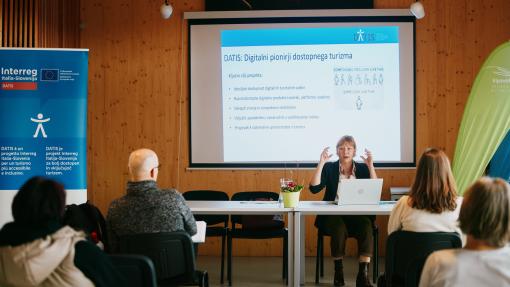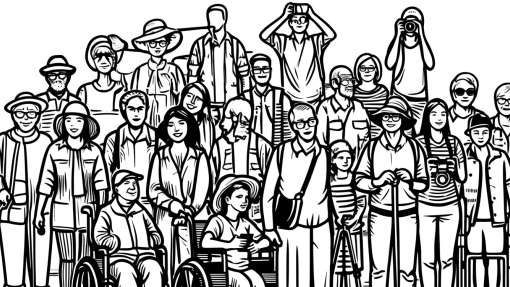
DATIS
Policy objective: PO4 - A more social and inclusive Europe implementing the European Pillar of Social Rights
Specific objective: SO 6 - enhancing the role of culture and sustainable tourism in economic development, social inclusion and social innovation
Typology: Standard project
Short description of the project: The DATIS project addresses the common challenge of digital accessibility and social inclusion in the tourism offer for seniors and people with disabilities in the Italy-Slovenia cross-border area. Despite the remarkable cultural and natural potential of the area, the local tourism industry only partially recognises the importance of digital accessibility. In particular, the accessibility of booking websites and apps for tourist accommodation and services often fall short of the standards set out in the Web Content Accessibility Guidelines (WCAG), as well as the necessary communication skills needed to interact with people with different disabilities. This limits the ability of these target groups to plan independent tours and make full use of the tourism offer available in the area.
The DATIS project helps improve digital accessibility and social inclusion in the tourism sector for seniors and people with disabilities in the Italy-Slovenia cross-border area, with a view to promoting an inclusive and accessible form of tourism. This is achieved by performing a detailed survey on travel experiences and needs, developing a joint action plan, web interface and mobile apps, training tourism professionals and implementing two pilots. The project adopts an innovative, multidisciplinary and participatory approach that sees the active engagement of the final users with disabilities at every step of the process, as well as the collaboration between the Italian and Slovene partners with complementary technological, social and tourism competencies.
First, a quantitative and qualitative survey with the direct involvement of the end users shall be conducted to analyse the digital accessibility of the tourism offer, both at a technological and a communication level. On the basis of the survey results, the Strategy and Recommendations for improving digital accessibility in the local tourism industry shall be developed. Subsequently, 4 cross-border workshops will be held to train 100 tourism professionals from Italy and Slovenia; final users shall be actively involved in the workshops as trainers. A multilingual manual on digital accessibility in tourism with case studies and practical examples will be produced.
The DATIS web portal shall provide data on the digital accessibility of tourism services in the project area. The portal will be WCAG-compliant and validated by users with disabilities. Two pilot actions in Italian and Slovene museums shall be the tested for innovative solutions with the involvement of people with different types of disabilities. The main deliverables of the DATIS project are:
a detailed analysis of digital accessibility in the tourism industry within the project area;
guidelines and a common strategy to improve digital accessibility;
training on this subject for 100 tourism professionals;
learning material on digital accessibility in tourism, the DATIS portal;
an analysis and reporting on the two pilots with an assessment of digital accessibility of the San Michele Museum by the members of the Mosaico cooperative and of the Museum of industrial heritage in Ajdovščina by members of the ZDSSS (Slovene Union of the blind and visually impaired).
All these measures help to improve the digital accessibility of tourism services to the benefit of people with disabilities and contribute to the development of more inclusive forms of tourism in the cross-border area. Cross-border cooperation is necessary to share knowledge between the Italian and Slovene partners, involve the final users in the border area, develop shared solutions and raise awareness internationally on the importance of digital accessibility in tourism. The lead partner has a decade-long experience in digital accessibility and can rely on a team of experts with different disabilities. The expertise transfer from Slovenia to the project area and the exchange of best practices and experiences between the Italian and Slovene partners will make it possible to identify and disseminate innovative approaches that have been developed locally for an accessible and inclusive tourism offer. The joint training of tourism professionals on both sides of the border promotes networking and the adoption of shared standards for digital and communicative accessibility. An awareness-raising campaign and the dissemination of the project results across the cooperation area has a strong and pervasive impact on a favourable change.
The cross-border DATIS portal can reach a larger number of users and provide uniform information on accessibility of digital tourism services in the area. By setting up an international network of tourism professionals, more emphasis is laid on recognising the importance of digital accessibility and social inclusion.
- To improve digital accessibility and social inclusion in tourism for people with disabilities and elderly people in the cross-border region Italy-Slovenia;
- To promote the development of inclusive and accessible tourism through an in-depth study on travel experiences and needs, a jointly developed action plan, a web interface, training of tour operators and two pilot actions.
- Strategy for improving digital accessibility in the tourism sector in Slovenia and Italy;
- Pilot analysis on digital accessibility in 2 museums in Italy and Slovenia;
- Training on enabling and maintaining adequate digital accessibility for tour operators and their employees in Slovenia and Italy.


